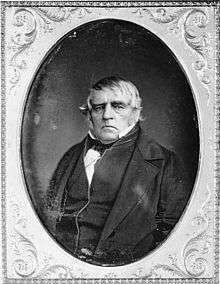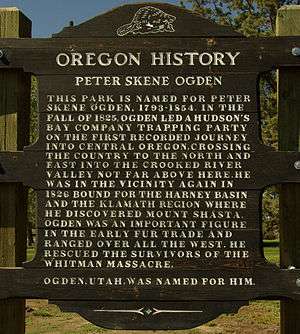Peter Skene Ogden
| Peter Skene Ogden | |
|---|---|
 | |
| Born |
Quebec City |
| Died |
September 1854[1][2] Oregon City, Oregon |
| Resting place |
Mountain View Cemetery, Oregon City, Oregon 45°20′28″N 122°35′25″W / 45.34120°N 122.5904°W |
| Nationality | British |
| Occupation | Fur trader, explorer |
| Employer | |
Peter Skene Ogden (alternately Skeene, Skein or Skeen), (baptised 12 February 1790 – September 27 1854[1]) was a fur trader and a Canadian explorer of what is now British Columbia and the American West.
Ogden was a son of Chief Justice Isaac Ogden of Quebec and his wife Sarah Hanson. The family was descended from a 17th-century British emigrant to the American colonies (Long Island and New Jersey). Both Isaac and his father David were loyalists during the American Revolution. Isaac relocated to England at this time, then later returned to British-run Quebec.[4] One of Ogden's brothers, Charles Richard Ogden was a lawyer, politician, and public servant from Canada East. Ogden married Julia Rivet/Reava, a Meti/Nez Perce (sometimes known as Flathead or other Salish).[2]
During his many expeditions, he explored parts of Oregon, Washington, Nevada, California, Utah, Idaho and Wyoming. Despite early confrontations with the Hudson's Bay Company (HBC) during his time with the North West Company, he later became a senior official in the operations of the HBC's Columbia Department, serving as manager of Fort Simpson and similar posts.
Professional life
After a brief time with the American Fur Company, he joined the North West Company in 1809. His first post was at Île-à-la-Crosse, Saskatchewan, Canada, in 1810, and by 1814 was in charge of a post at Green Lake, Saskatchewan, 100 miles (160 km) south.[2]
Ogden had frequent run-ins with the rival HBC employees and engaged in physical violence on several occasions. In 1816, HBC clerks reported that Ogden killed an Indian who had traded with the Hudson's Bay Company. The Indian was "butchered in a most cruel manner," according to HBC officer James Bird. Although many in the North West Company viewed this as a necessary part of living in the Northwest, the HBC viewed Ogden as a dangerous man whose actions were deplorable, especially considering his background as the son of a judge. Ogden was charged with murder, and the North West Company moved him further west to attempt to avoid any further confrontations with the HBC. He served at different posts in modern-day Oregon, Washington, and British Columbia for the next several years.

As a way of ending the ongoing strife between the two companies, the HBC and the North West Company merged in 1821. Ogden's violent history placed the now larger HBC in a quandary. Some in the company management severely disliked and distrusted Ogden, but newly appointed governor George Simpson pushed for his reinstatement, arguing that he had done no more than many others during the "fur-trade wars." Ogden was admitted to the reconfigured HBC with the rank of Chief Trader in 1823, and put in charge of Spokane House. In November 1824 he was put in charge of the Snake River Country of the HBC's Columbia Department Expedition.
Between 1824 and 1830, Ogden led a series of expeditions to explore and trap in the Snake River country. One of the company's objectives was to bring as many furs from this area as possible to the HBC so as to create a "fur desert". This would discourage inroads by American trappers and traders. The exploration trips included:
- 1824–25: Ogden led a fur brigade which expanded HBC's influence along the Snake River east to Montana's Bitterroot River and south to the Bear River in modern Utah. During this trip, near modern Mountain Green, Utah, 23 freemen, independent trappers outfitted by HBC, defected with about 700 beaver pelts to Americans operating in the area.[5]
- 1825–26: Traveling south from the Columbia River to the Deschutes River in Oregon, Ogden then turned east and traveled through the Blue Mountains to the Snake River.
- 1826–27: From Walla Walla, in present-day Washington, this expedition also explored the Deschutes River, following it to Klamath Lake and an area near Mount Shasta in Northern California.
- 1828–29: Ogden explored the Great Salt Lake and the Weber River drainage, where the Ogden River, and subsequently the current city of Ogden, Utah, are named for him. He explored areas of the western Great Basin, finding and following the river later named for the German naturalist Alexander von Humboldt 330 miles (530 km) west to its dry sink in modern-day Nevada.
Jedediah Strong Smith, an American fur trapper and explorer, was the first American to cross the Great Basin in 1827. He traversed the basin west to east from the Sierra Nevada near Ebbetts Pass.[6] Smith, however, missed Humboldt Lake and the Humboldt River and nearly died for lack of food and water. Ogden's easier route following the river later became part of the California Trail.
In 1830, Ogden was sent north to establish a new HBC post named Fort Simpson near the mouth of the Nass River in British Columbia. He also managed an outpost on the south coast of Alaska. In 1834 he was promoted to Chief Factor, HBC's highest field rank. He administered Fort Vancouver in the late 1840s. There Ogden fought successfully against American fur competition and successfully negotiated with local native tribes, including the Cayuse.
In 1847, Ogden averted an Indian war and successfully negotiated for the lives of 49 settlers taken as slaves by the Cayuse and Umatilla Indians after the Whitman massacre.
Retirement and death
Ogden retired to Oregon City, Oregon, with one of his several Native American wives. His contact with native tribes led him to write a memoir, Traits of American Indian Life and Character. By a Fur Trader. The book was published posthumously in 1855. He died in 1854 and is buried at the Mountain View Cemetery in Oregon City, Clackamas County, Oregon.
Legacy
Places named for Peter Skene Ogden include:
- Ogden, a city in Utah
- Ogden, a former town and now a neighbourhood in Calgary, Alberta, Canada
- Ogden Avenue, a street in downtown Las Vegas, Nevada
- Ogden Middle School in Oregon City, Oregon
- Ogden Point in Victoria, British Columbia, Canada
- Peter S. Ogden Elementary School in Tumwater, Washington
- Peter S. Ogden Elementary School in Vancouver, Washington
- Peter Skene Ogden Secondary School in 100 Mile House, British Columbia, Canada
- Peter Skene Ogden State Scenic Viewpoint in Jefferson County, Oregon
- S.S. Peter Skene Ogden. The ship was laid down 18 October 1942 and launched 14 November 1942. She was torpedoed off the coast of Algeria in 1944. And while she did not sink, she was scrapped.
See also
References
- 1 2 3 "Peter Skene Ogden". Dictionary of Canadian Biography – via biographi.ca.
- 1 2 3 4 LaLande, Jeff. "Peter Skene Ogden (1790-1854)". Oregon Encyclopedia - Oregon History and Culture. Portland State University. Retrieved 3 March 2013.
- ↑ See File:Ogden1.jpg
- ↑ "A History of the Ogden Family". Presented to the United Empire Loyalists Association in Toronto, February 11, 1932. 1908 – via tripod.com.
- ↑ Holloway, Thomas H., “‘Now We Go’: Snake Country Freemen and the Desertions of May 1825,” The Rocky Mountain Fur Trade Journal, Vol. 12 (2018), pp. 37–73.
- ↑ Morgan, Dale Lowell (1953). Jedediah Smith and the Opening of the West (ed. 1964; 1971 reprint ed.). University of Nebraska Press. pp. 210–11.
- "Peter Skene Ogden". Snake Country Journals – via xmission.com.
External links
| Wikimedia Commons has media related to Peter Skene Ogden. |
- Traits of American-Indian life and character (1853)
- Peter Skene Ogden's Journal of His Expedition to Utah, 1825, edited by David E. Miller
- "Journal of Peter Skene Ogden; Snake Expedition, 1828-1829". The Quarterly of the Oregon Historical Society. 11. 1 December 1910. Retrieved 12 April 2013.
- Peter Skene Ogden at Find a Grave